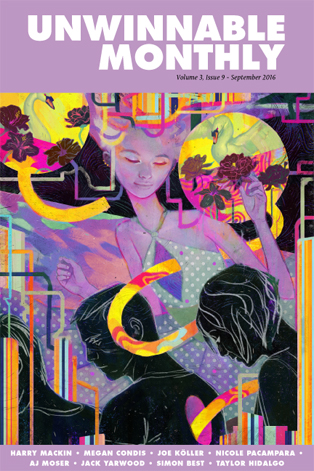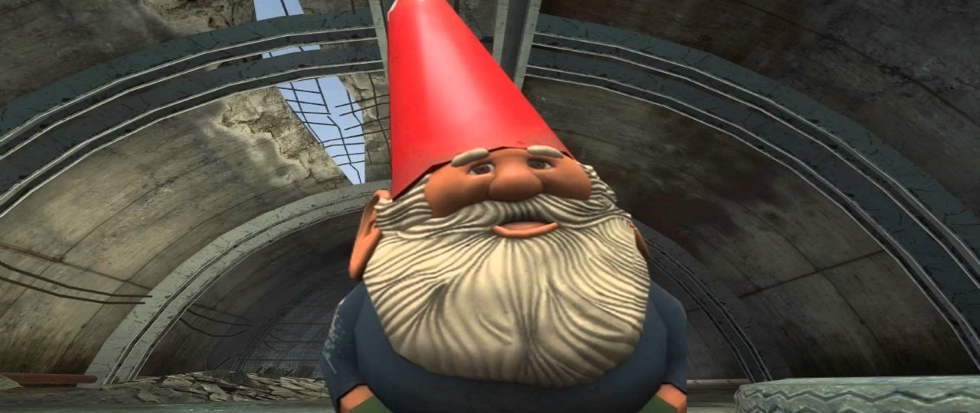
Love Issue – Theme Recap
 In September, Unwinnable Monthly was about love.
In September, Unwinnable Monthly was about love.
As humans we tend to say that we love just about anything that satisfies the innermost longings of our hearts. Love enables us to see the good in others while defying logic. It forces one to face the inevitable and to fight for something or someone without knowing what the future holds. Love, whether experienced with another human or a fictional character, has the power to mend or break us.
Below are a few excerpts from last month’s issue. To read the full stories, buy the issue!
Love is Wanting to Believe, by Harry Mackin
Harry discusses The X-Files and how the mind absent logic uses love to reveal truth.
In The X-Files, love is the radical defiance of logic; it is the ability to see the flaws in each other’s story and choose to believe the story anyway, to accept the conclusion is true even if you don’t accept the premises. It’s the ability to choose to elevate one another, to cooperate in spite of tremendous pressure to compete, and to make each other’s stories true. Mulder and Scully believe in each other, and this allows them to believe in and love the victims of the evil they oppose. They can listen to the groups of marginalized, abducted women ridiculed and abandoned by their own families, the depressed insurance salesmen who sees dead people, or the schizophrenic recording UFO sightings and living in an RV. They choose to believe in these people in spite of every facet of the system’s logic, our logic, demanding they don’t. This is the difference that makes opposition possible. According to The X-Files, the radical choice to love, to want to believe beyond our own cynicism and suspicion, is how we can resist an evil system. The truth is out there, and we need love to find it.
Hate the Game, by Megan Condis
Megan presents a compelling view on how women are portrayed in video games.
What if love really could be gamified? What if the secret code to open any woman’s heart could be discovered, like some kind of sexual ultra combo?As Neil Strauss put it in his best- selling guidebook to the world of PUA, “crack the code that is woman.” This rhetoric transforms individual women into representatives of a Conspiracy of Women that must be defeated, by hook or by crook, and relieved of their “treasure”: access to sex. They are thought of as not unlike monsters in any MMO: interchangeable and with no agency of their own. They are not players within the game. They are the enemies and once players learn their pre-scripted attack and defense patterns, they can be farmed for experience. In addition to dehumanizing and objectifying women, the dating game being played by PUAs and their pupils makes it difficult, if not impossible, to conceive of things like consent and mutual pleasure. When sex is constructed as something that women have and don’t want to give up, then it makes sense that men are forced to manipulate and coerce them in order to take it. By this logic, at best, sex could be consensual if women secretly enjoy having their “no” ignored or overridden. At worst, consensual sex would be impossible as every encounter would entail someone “winning” and someone “losing.”
Romantic Conquest, by Joe Köller
Joe evaluates the manipulative formations of relationships in video games and how the player should be the one to decide what happens next.
By treating love as just another puzzle to be figured out, games are encouraging players to see reluctance as an obstacle to be overcome and affection as a prize to be won – often alongside achievements and gameplay rewards dedicated to romance. This approach to modeling relationships trends towards creating invasive behaviors: personal boundaries become just another limitation that efficient strategies learn to work around, as in my digital stalking. Whether it’s possible to systemize intimate relationships without ending up with a reductive and easily-gamed model remains to be seen. Even in our day-to-day life, it’s hard to find a definition for love that is neither too cynically chemical nor too naively emotional. Even without a perfectly detailed rendering, however, games can do their best to prevent their players from brute- forcing relationships through social engineering.
The Manipulation of Time and Love, by Nicole Pacampara
If you had the chance to have a do-over, would you take it? Nicole uses movies like Groundhog Day and About Time to talk about spontaneous love (or the lack thereof).
The traveler can always go back. They know the many branches of how an encounter will unfold. They might even know more about you than you are willing to reveal. In short, not only can the time traveler manipulate time, but also relationships. This is an uneven relationship with the time traveler having the upper hand both in knowledge but also the flexibility to make and fix mistakes. The carefully constructed performance then becomes frightening and almost stalkerish in nature. Any time traveler could use time to build an accurate profile of a would-be partner, straight from their own mouths and behaviors. The beauty of love comes from its spontaneity. While time moves our relationships into a rhythm of familiarity, there is always a lingering sense of uncertainty about what people in our lives will do. This uncertainty is a double- edged sword because it can create delightful surprises (like a lover doing something unexpectedly sweet) or the most crushing of disappointments (like a lover’s betrayal).
Love of Life, by A.J. Moser
After viewing Swiss Army Man, A.J. discusses the importance of defining love for ourselves.
Trapped in an uncharted wilderness, they understand that love can mean many different things. While the viewer will likely never be stranded on an island with a flatulent corpse, they will certainly have felt themselves falling for someone or have had a tough conversation with their family. The film is actually about this ambiguous power of love and having a dead body as one of the main characters allows for a level of self-awareness that would have been hard to obtain otherwise. Just like its characters do, the film wants us all to tell our friends we love them, think of our families and to enjoy the awkward, embarrassing moments that come with falling in love. The directors are encouraging flat-out discussion when it comes to love and loneliness. It is an insightful celebration of the human body – everything, even the parts that tend to be weird.
Love for Gaming’s Most Hated Consoles, by Jack Yarwood
This month, Jack fills us in on gaming systems that need a little bit of love despite not making it to the big leagues.
Robert Feinberg, an Atari Jaguar collector, is a member of said following. He started collecting for the system 10 years ago, after doing some research into old Atari products in his recreational time. Tired of collecting popular consoles, like the Nintendo Entertainment System and the Sega Genesis, the prospect of owning a Jaguar fascinated him to the point he slowly began to build his library of games. Robert has managed to uncover several hidden gems and diamonds in the rough that challenge accepted wisdom about the console. “Every console has at least some redeeming qualities and exclusive games. For example, CD-i had three Zeldas and a Mario. They are poor games, but still a legendary part of gaming history. Experiencing this kind of history first hand . . . is a goal of it’s own.
Gone Gnome, by Simon Best
Simon found love in Half Life 2: Episode Two with an unforeseen companion.
Love is, by its nature, unpredictable and unscripted. It doesn’t work as a narrative choice, defined and prescribed after a boardroom analysis of a videogame’s key demographic. Love can’t be used as shorthand for human connection. It isn’t quick emotional super glue. Love, as we experience it, is not just a happy stack of rainbows; it’s rough and improvised, something that needs to be fought for. However, it can sometimes be created: I have felt love in a game, but not with a woman, or man, or anthropomorphized robot. Instead, it was in the silent garden gnome that spent most of Half Life 2: Episode Two grinning up at me. I’ve always felt scripted love to be so hollow – instead of the overused saccharine idealism, real love has spikes. It is proven through losses as well as gains. The struggle balances with occasional bliss and, sometimes, every shared moment of simple survival is enough.
Things That Go Boing, by Taylor Hidalgo
Taylor informs us of the unexpected love he discovered in Earthbound.
Sex isn’t that hard to portray, though. Games have been doing it almost for as long as games have existed. The physical action of bodies molding and entwining is an easy thing to display and explore, but the actual bits and bobs – fitting of male cables into female ports – is nothing unfamiliar. But sex isn’t love. Sex tends to go hand-in-hand with love and is a very indicative of a kind of passionate relationship, but they’re still distinct. Yet games hardly make the distinction. Loving characters engage in sex. Sex illustrates a deep commitment to love, but it isn’t love, not really. There’s more to a loving relationship than just loving between-the-sheets.? So imagine my surprise when I realized that I’d had the emotional and romantic equivalent of a one-night stand with Mr. Saturn from Earthbound. Mr. Saturn, and the Saturn Valley, provided me with everything I’d come to expect from a comfortable relationship. They had done so with only my goodwill in mind, never judged or questioned me for my troubles or pains, offering only support and seemed to always hold me in their hearts. On the other hand, perhaps there’s just something inherent in kindness that has to be holistic without the lingering feeling of expectation. Maybe there’s a nuance to the shambling dialog of Mr. Saturn that feels personal in its alienness, like a code language built up around shared affection.




